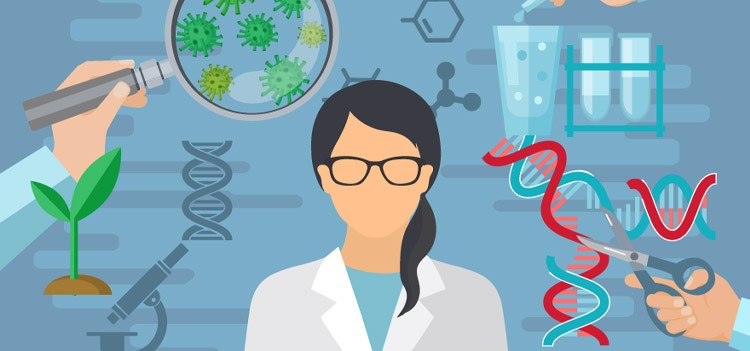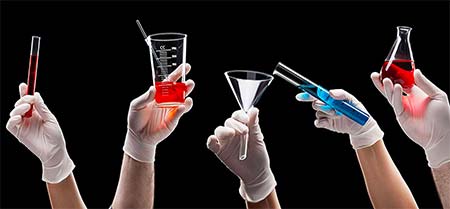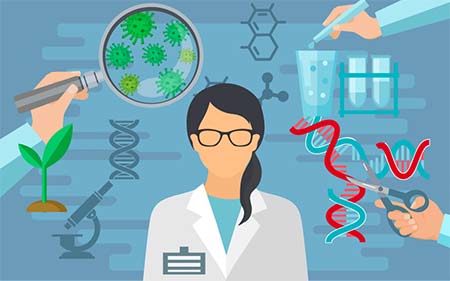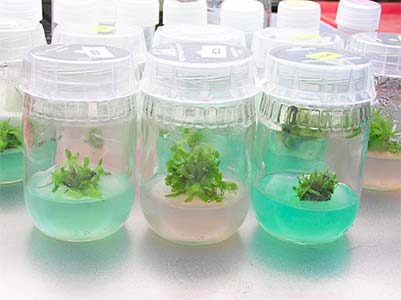INTRODUCTION
The Master of Science (MSc) in Biotechnology degree is a two-year post-graduate course in the life science subject Biotechnology. Biotechnology is the branch of science which deals with the application of biological processes in research and science that involves engineering, medicine, technology, manufacture, purification, and energy conservation. It is done through the use of living organisms and biological systems. The course is usually undertaken after a three-year BSc graduate degree program and prepares candidates for application and research-based careers in engineering and technology. The course provides in-depth knowledge about Biotechnology and emphasizes on the theoretical and practical concepts and the fundamentals of biological processes and their applications. It also involves the basic concepts of Biology, Chemistry, Genetics, and Mathematics. Important theories are taught that involve organ, cellular, and biomolecular processes to identify and develop products that help to improve and simplify our daily lives. Candidates are trained to apply and strategically use cellular and biomolecular processes to develop products that help to improve and simplify the quality of life, improve and enhance standard of living, protect and conserve the environment, and develop renewable resources to benefit and enhance daily life, profession, research, and the industry.
The course enhances personal skills like communication, leadership, strategic thinking, attention to detail, teamwork, logic, presentation, and analysis; and professional skills like planning and execution, problem-solving, critical thinking, research, analytical thinking, and reasoning.
SCOPE OF MSC BIOTECHNOLOGY
MSc Biotechnology graduates have multiple opportunities in the fields of Research and Science. Opportunities can be found in:
- Students can contribute as scientists in national laboratories and organizations like:
- Indian Analytical Testing Laboratory
- National Institute Of Immunology
- Indian Institute of Science
- Indian Institute of Technology
- Central Institute of Cotton Research
- Indian Council of Agricultural Research (ICAR)
- National Accreditation Board for Testing and Calibration Laboratories (NABL)
- Food and Drug Toxicology Research Centre
- All India Institute of Hygiene & Public Health
- Indian Institute of Agricultural Biotechnology
- Central Avian Research Institute
- Raja Ramanna Centre for advanced Technology (RRCAT)
- Central Institute of Agricultural Engineering
- Students can become Research Associates in research institutes like:
- Institute for Plasma Research (IPR)
- Bose Institute
- National Institute of Animal Nutrition and Physiology
- Anand Diagnostic Laboratory
- Central Agroforestry Research Institute
- Bioline Pharma
- National Academy of Agricultural Research & Management
- Equinox Pharma
- Department of Science & Technology (DST)
- Consortium for Scientific Research (CSR)
- Agharkar Research Institute (ARI)
- Indian Institute of Science Education and Research (IISER)
- Institute of Nano Science and Technology (INST)
- Students can assist in laboratories and institutes of Council of Scientific and Industrial Research (CSIR) like:
- Centre for Cellular & Molecular Biology (CCMB)
- Institute of Genomics & Integrative Biology (IGIB)
- National Institute of Interdisciplinary Science and Technology (NIIST)
- National Institute of Science (NIS)
- Institute of Microbial Technology (IMTECH)
- National Environmental Engineering Research Institute (NEERI)
- Indian Institute of Chemical Biology (IICB)
- Central Food Technological Research Institute (CFTRI)
- Indian Institute of Integrative Medicine (IIIM)
- Technology and Development Studies (NISTADS)
- Central Institute of Medicinal and Aromatic Plants (CIMAP)
- Indian Institute of Toxicology Research (IITR)
- National Institute of Science Communication and Information Resources (NISCAIR)
- Central Leather Research Institute (CLRI)
- Central Scientific Instruments Organisation (CSIO)
- National Institute of Oceanography (NIO)
- Students can contribute in agricultural research services
- Teaching positions in secondary and higher secondary schools, degree colleges, engineering colleges, and universities
- Tutoring in Biology and Chemistry for reputed coaching institutes
- Professional certifications in specializations like:
- Environmental Biotechnology
- Molecular and Cell Biology
- Advanced Biological Chemistry
- Genomics and Proteomics
- Nano Biotechnology
- Nutrigenomics
- Industrial Biotechnology
- Bioprocess Engineering
- Stem Cell Technology
- Genetic Engineering
- Fermentation Technology
- Biochemical and Biophysical Techniques
- Regenerative Medicine
ADMISSION AND ELIGIBILITY
Colleges and universities offer admission on the basis of two main modes of admission:
- Merit - colleges invite for Application Forms. Interested candidates can apply once the applications are open through entrance examination, group discussions, and personal interview
- Management - students can go for Direct Admission
Important considerations for admission:
- Marks in Bachelor’s degree
- Qualification in competitive entrance examinations
Important points to consider for eligibility to do MSc Biotechnology:
- Minimum 55% aggregate marks in Bachelor’s degree from any University in India or abroad recognised by UGC/AIU
- Compulsory subjects – Biology, Chemistry, and English
- Candidates who are in the final year of their studies and writing their final year examination with 55% aggregate marks in all the semesters/years of Undergraduate Examinations
- Ratio based on both entrance exam score (85%) and academic record (15%) is considered for admission
COURSE CURRICULUM
The entire program of MSc Biotechnology is divided into two years with each year split into two semesters. In the two-year duration, 16 Theory papers and 7 Practical papers are covered with additional skill-enhancing programs and workshops. The course consists of:
- The fundamental concepts, principles, and applications of Biotechnology
- Important subjects and topics included:
- Agricultural Biotechnology
- Analysis of Soil and Water
- Animal Biotechnology
- Bacteriology and Virology
- Bioenergetics
- Bio-entrepreneurship
- Bioinstrumentation
- Bioinformatics
- Biological Chemistry
- Bioprocess Engineering
- Biostatistics
- Cell Biology
- Cell Culture Technology
- Database Management
- Data Mining
- Environmental Biotechnology
- Enzymology
- Fermentation Technology
- Gene Expression
- Genetic Engineering
- Gene Organization
- Immunology
- Microbial Genetics
- Microbial Genomics
- Molecular Biotechnology
- Molecular Enzymology
- Nutrigenomics
- Plant Biotechnology
- Physiology
- Preservation
- Processing of Products
- Proteomics
- Recombinant DNA Technology
- Spoilage of Food
- Wastewater Management
- Practical classes consist of:
- Dry Laboratory Techniques
- Wet Laboratory Techniques
- Electives are included for further specialization
- Guided Dissertations and Projects for practical exposure
- Certification and Foundation Courses for holistic development
- Study Tours to reputed national laboratories, research institutions, and industries, under the supervision of the department
- Seminars
- Lectures by experienced faculty and scientists
- Workshops
- Tutorials and Brainstorming Sessions
QUALIFYING ENTRANCE EXAMINATIONS
In order to get admission through Merit into reputed colleges in India, qualification in entrance examinations is important. The examinations may be national, state, and institution-specific. These examinations:
- Are NOT mandatory but may be required for certain colleges/universities to be considered for the Merit category
- Consist of objective type questions with MCQs
- Syllabus includes 4 main sections:
- English Grammar and Comprehension
- Quantitative Reasoning
- Analytical Thinking
- Numerical/Graphical Analysis
- A maximum of 4 options will be given to aspirants
- Negative marking may be present
FUTURE PROSPECTS
After successful completion of MSc Biotechnology course, students have many opportunities:
- Research Associate in national and international research laboratories
- Teacher, Professor, or Lecturer in schools, colleges, or universities
- Research Scientist
- Public and Private companies and MNCs
- M.Phil. in Biotechnology
- Ph.D. in Biotechnology
- Diploma in subjects like Genetic Engineering, Medical Biotechnology, or Agricultural Biotechnology
INTERNSHIPS AND PROJECTS
The course curriculum of MSc Biotechnology includes opportunities for students to obtain practical exposure. Summer internships, dissertations, and projects provide a strong foundation for a career in Research. Points to remember:
- Students are trained to write a clear scientific report that includes a theoretical background, experiment description, presentation of methodology, analysis of results, careful interpretation and evaluation of data, and conclusion
- The Research Project is an opportunity to get hands-on training and laboratory exposure In the final evaluation, class assignments, end-semester exam results, internships, and project reports are taken into account for a candidate to earn their MSc Biotechnology degree.
CAREER OPPORTUNITIES
Multiple career opportunities are available in public and private academic institutions, medical start-ups, research laboratories, atomic and space organizations, meteorology departments, telecommunication organisations, pharmaceutical companies, manufacturing companies, corporates, MNCs, and medical industries. Potential career roles:
- Teacher
- Research Scientist
- Lecturer/Professor
- Biotechnologist
- Research Analyst
- Consultant
- Online Tutor
- Subject Matter Expert (SME)
- Biotechnology Project Mentor
- Lab Assistant
- Training Manager
- Auditor
- Research Associate
- Junior Research Fellow
- Research Scientist
- Quality Assurance Manager
- Quality Control Manager
- Research Biochemist
- Clinical Research Associate (CRA)
- Clinical Reviewer
- Clinical Data Manager
- Medical Coder
- Biomedical Scientist
- Medical Technologists
- Food Technologist
- Regulatory Affairs Associate
- Scientific Laboratory Technician
- Physician Associate
- Lab Technician
- Marketing Manager
- Medical Representative
- Capitalist Analyst
- Business Development Manager
- Chemical Engineer
- Environmental Engineer
- Industrial Engineer
- Safety Specialist
- Medical Device Manufacturer
POPULAR RECRUITERS
Graduates can find employment in many public and private companies. Popular recruiters are:
- Schools
- Colleges
- Research Centers
- Abbott Laboratories
- Baxter Research
- Bristol-Myers Squibb
- Johnson & Johnson
- Infosys
- Zydus Cadila
- Accenture
- Cipla Inc.
- Biocon
- Dr. Reddy Laboratory (DRL)
- Ranbaxy Laboratories
- Wockhardt Ltd.
- Roche Diagnostics Corporation
- Quintiles Inc.
- Boston Scientific Corporation
- Lupin Limited
- Sciformix
- Emcure
- Cognizant
- Merck
- Bioceramics Limited
- Invitrogen
- GlaxoSmithKline’
- Reliance Life Sciences
- Torrent Pharma
- Pfizer
- Syngene
- Wipro
- Syneos Health
- Capgemini
- Novartis
- Tata Consultancy Services Limited
- Thermo Fisher Scientific, Inc.
- Siron Technology Pvt. Ltd.
- Lakshmi Life Sciences Ltd.
- Jubilant Life Sciences
SALARY PACKAGE
Fresh graduates can easily get jobs in popular scientific research companies. Job positions start as Trainee and gradually proceed to Senior Associate/Scientist. With more career exposure, project experience, skills, and certifications, a salary hike of about 20% to 25% is guaranteed together with additional benefits and bonuses. The average salary after MSc Biotechnology ranges between 2.5 LPA to 12 LPA. The lowest salary expected (for a fresh graduate) is between 2 LPA to 4 LPA and with work experience increases to 15 LPA to 18 LPA.
CONCLUSION
MSc Biotechnology is one of the most popular life science courses in India. The two-year MSc Biotechnology post-graduate course is designed to prepare students for a career in research. The curriculum consists of strong theoretical concepts, practical experiments, and skill-building programs that create a balance between academics and practical exposure. This degree is available for students all over India and admission is subject to eligibility criteria. Multiple internships, project, and career opportunities are available in various departments, business sectors, and professional fields. Graduates are prepared for ANY type of job opportunity in the future.





